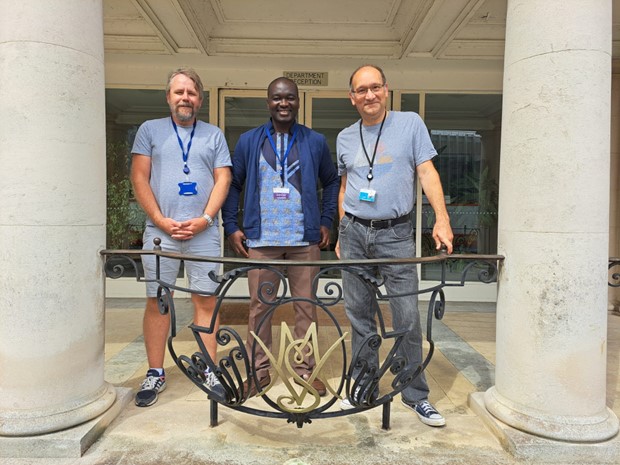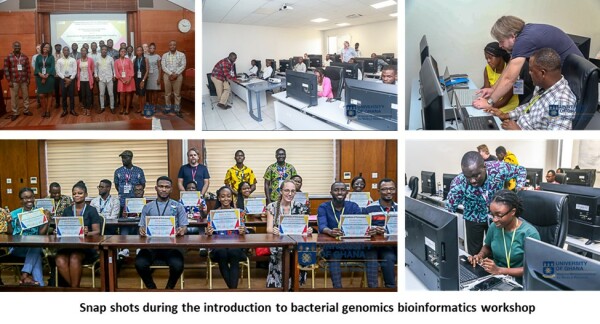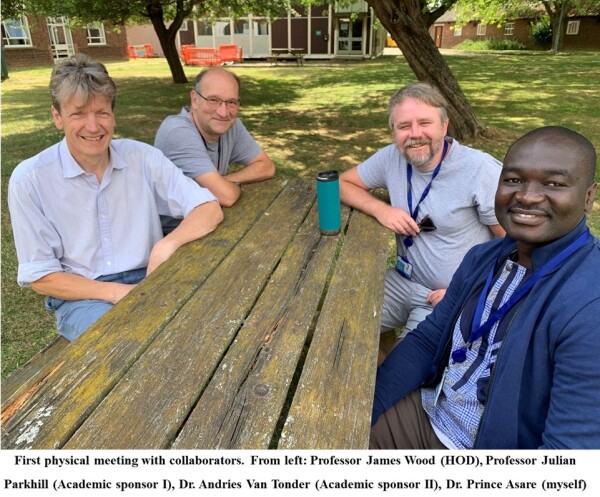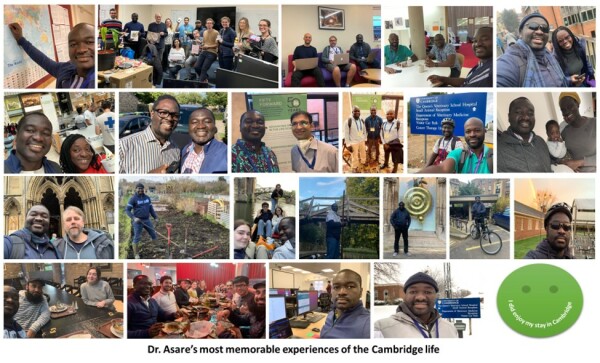Dr Prince Asare's bioinformatics journey


As a young scientist, and a trained molecular epidemiologist, I have developed a keen research interest in Mycobacterial diseases over the past decade. Born and bred in Accra, I originally wanted to study Engineering in Japan, whilst my parents wanted me to pursue Medicine at the University of Ghana Medical School. Although, unsuccessful with these dreams of engineering, I was successful in being shortlisted for medical school interview in 2008. Unfortunately, I wasn’t admitted as a regular student and continued my undergraduate studies in Biochemistry, a field I have never regretted entering.
A one-month internship at the then Centre for Scientific Research into Plant Medicine (now, Centre for Plant Medicine Research) aroused my interest in scientific research, which was later strengthened by several mentors from the Biochemistry department. Under the combined supervision of the current director at Noguchi Memorial Institute for Medical Research - University of Ghana (NMIMR-UG), Prof. Dorothy Yeboah-Manu, and the head of the TB Research Unit at the Swiss Tropical and Public Health Institute (SwissTPH), Prof. Sebastien Gagneux, I was awarded the UG Vice Chancellors Award for Producing an Outstanding Doctoral Dissertation in the Sciences for the 2019/2020 academic year.

Following a successful application to the Cambridge-Africa ALBORADA Research Fund, I joined the Pathogen Genomics and Evolution group (PGEG) in the Department of Veterinary Medicine in July 2022 to work alongside Dr Andries van Tonder on a collaborative research project that sought to characterize Mycobacterium bovis population structure and transmission in animals and people in Northern Ghana. The award was designed to cover the costs of sequencing and analysing 150 M. bovis isolates previously collected by Prof. Yeboah-Manu’s research team, as well as a month long stay in Cambridge where I would be able to expand on my existing bioinformatics knowledge.
Using this grant as a starting point, I applied for, and was awarded, an African Research Excellence Fund (AREF) Fellowship which enabled me to extend the stay in Cambridge by five months as well as cover the costs of sequencing an additional 40 isolates. The extra time in Cambridge allowed me to continue to build on my computational skills by one-on-one learning in PGEG and by attending various training courses arranged by the University of Cambridge Bioinformatics Training Facility and the European Bioinformatics Institute (EBI).
Alongside the training and analyses, one of the aims of my AREF Fellowship was to develop an ‘Introduction to Bacterial Genomics’ workshop that would be held at the NMIMR-UG following my return to Ghana. To help support the teaching on the course, Dr van Tonder and I applied for a second Cambridge-Africa ALBORADA grant to cover some of the costs of the course and to pay for Dr van Tonder’s travel to Ghana in January 2023 to help teach the course.
Since leaving Cambridge, along with the successful delivery of the first ‘Introduction to Bacterial Genomics’ workshop, I have focused on building my grantsmanship by assisting with the writing of a number of proposals with collaborators in and outside NMIMR-UG, working on a manuscript to describe the work done in Cambridge and the support provided to postgraduate students. Given the demand for places on the first workshop, I plan to apply for more funding to support the organisation of future workshops in order to make it an annual event. In this way I hope to contribute significantly towards building the next generation of applied bioinformaticians in Ghana.
During my stay in Cambridge, I was able to find time for fun and new experiences which included punting, sight-seeing and monthly dinners arranged by the PGEG.
Dr Prince Asare is a Research Fellow in the Bacteriology Department of the Noguchi Memorial Institute for Medical Research - University of Ghana. He completed his PhD in Molecular Cell Biology of Infectious Diseases in 2020 at the West African Centre for Cell Biology of Infectious Pathogens (WACCBIP) in the Biochemistry Department at University of Ghana.


